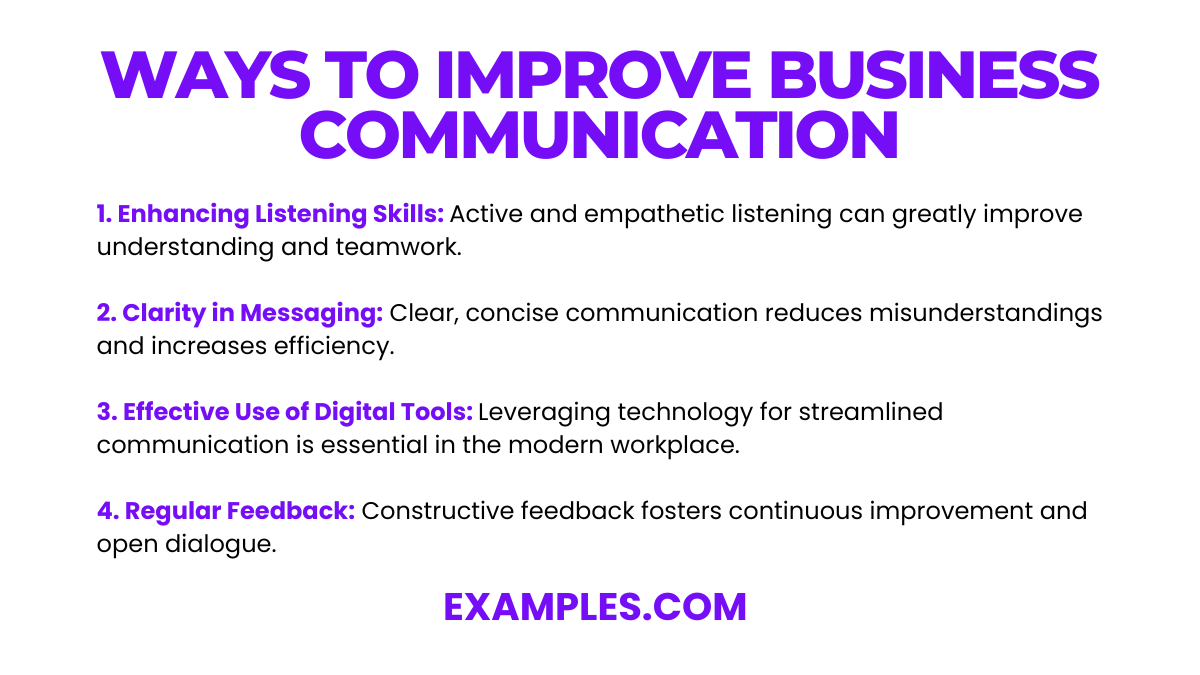How to Improve Business Communication?
Embark on a journey to enhance business communication with this detailed guide, rich in communication examples. Discover effective communication strategies and methods to elevate your professional communication skills development. Learn the subtleties of business email etiquette and team communication techniques to foster more engaging and productive interactions. By integrating cross-cultural communication in business and understanding the nuances of non-verbal communication in the workplace, this guide offers a holistic approach to refining business communication, crucial for thriving in today’s professional landscape.
Download Tips to Improve Business Communication PDF
How to Improve Business Communication-Meaning
Improving business communication involves enhancing the clarity, efficiency, and effectiveness of interactions within the workplace. This comprehensive guide, filled with vivid communication examples, aims to illuminate the meaning and significance of refined business dialogues. Covering aspects from interpersonal communication in business to leveraging business communication tools and technologies, it provides actionable insights for both individuals and teams. Learn how to apply non-verbal communication in the workplace and explore various feedback methods for business communication, equipping yourself with the skills to foster a more dynamic and productive business environment.
Ways to Improve Business Communication
Improving business communication is a multifaceted process that involves various techniques and practices to enhance clarity, effectiveness, and collaboration in a professional setting. Key strategies include:
- Enhancing Listening Skills: Active and empathetic listening can greatly improve understanding and teamwork.
- Clarity in Messaging: Clear, concise communication reduces misunderstandings and increases efficiency.
- Effective Use of Digital Tools: Leveraging technology for streamlined communication is essential in the modern workplace.
- Regular Feedback: Constructive feedback fosters continuous improvement and open dialogue.
- Cultural Sensitivity: Being aware of and respecting cultural differences in communication styles.
- Continuous Learning: Regular training and workshops to develop communication skills.
- Open and Transparent Communication: Encouraging a culture of openness leads to trust and better teamwork.
- Non-Verbal Communication: Understanding and using body language and other non-verbal cues effectively.
- Adapting Communication Style: Tailoring communication to different situations and audiences for maximum impact.
- Encouraging Collaboration: Promoting a collaborative environment where ideas and information flow freely.
Each of these methods contributes to a more effective and cohesive business communication environment, leading to improved workplace relationships and productivity.
How to Improve Business Communication at Workplace
Improving business communication at the workplace is key to enhancing overall productivity and collaboration. This involves adopting a range of strategies and practices that promote clear, effective, and efficient information exchange among team members.
- Regular Team Meetings
- Hold frequent team meetings to ensure everyone is aligned with goals and updates.
- Example: “Let’s discuss our project progress in today’s team meeting.”
- Clear Email Communication
- Use precise language and a clear subject line in emails to avoid confusion.
- Example: “Please find attached the revised project plan for your review and feedback.”
- Effective Use of Communication Tools
- Utilize various communication tools like Slack or Microsoft Teams for different purposes.
- Example: “I’ve shared the document on Teams for collaborative editing.”
- Active Listening
- Practice active listening to understand and respond appropriately to team members.
- Example: “I understand your concerns; let’s explore potential solutions together.”
- Feedback Culture
- Encourage open and constructive feedback to foster continuous improvement.
- Example: “I appreciate your input on the presentation; it helped refine our approach.”
- Empathy in Communication
- Show empathy in interactions to build trust and rapport with colleagues.
- Example: “I understand the challenges you’re facing with this client.”
- Professional Development Workshops
- Organize workshops for enhancing communication skills among employees.
- Example: “Join our workshop on effective communication strategies next Thursday.”
- Cross-Cultural Awareness
- Foster an understanding of different cultural communication styles in a diverse workplace.
- Example: “Let’s be mindful of our international colleagues’ communication preferences.”
- Clarity in Instructions
- Provide clear, concise instructions to avoid misunderstandings.
- Example: “Please complete the report by EOD Thursday, following the outlined format.”
- Open Door Policy
- Implement an open door policy to encourage open communication at all levels.
- Example: “Feel free to drop by my office if you have any concerns or ideas to discuss.”
How Can Communication in a Business Be Improved?
Improving communication in a business setting is crucial for operational efficiency and employee satisfaction. Here are key strategies:
- Developing Strong Listening Skills: Encouraging active listening among team members enhances understanding and collaboration.
- Implementing Effective Communication Training: Regular training sessions can improve skills like clarity, brevity, and persuasive communication.
- Utilizing Modern Communication Tools: Adopting contemporary tools and platforms facilitates smoother and faster communication.
- Fostering an Open Communication Culture: Creating an environment where feedback and ideas are freely exchanged can lead to innovation and problem-solving.
- Personalizing Communication: Tailoring messages to specific audiences, whether internal or external, ensures better understanding and engagement.
- Emphasizing Non-Verbal Communication: Recognizing and effectively using body language and tone can enhance message delivery.
- Regular Feedback Mechanisms: Implementing structured feedback systems helps in identifying areas of improvement and acknowledging accomplishments.
- Enhancing Team Collaboration: Promoting teamwork and collaborative efforts can improve communication dynamics and overall productivity.
- Cultural Sensitivity Training: Understanding diverse communication styles and cultural nuances improves global business interactions.
- Encouraging Conciseness and Clarity: Training employees to communicate their ideas succinctly and clearly can greatly reduce misunderstandings.
By incorporating these practices, businesses can significantly improve their communication, leading to a more harmonious and productive work environment.
Tips to Improve Business Communication
Enhancing business communication is essential for a thriving work environment. Here are some tips:
- Develop Active Listening Skills: Actively listen to understand, not just to respond, improving mutual understanding and respect.
- Practice Clarity and Conciseness: Be clear and to the point to avoid misunderstandings and save time.
- Enhance Email Communication: Use clear subject lines and concise content in emails for effective communication.
- Foster a Feedback Culture: Regularly give and receive constructive feedback to improve communication.
- Embrace Cultural Diversity: Understand and respect diverse communication styles in a global business environment.
- Use Technology Effectively: Leverage digital tools for efficient communication and collaboration.
- Improve Non-Verbal Skills: Be aware of body language and other non-verbal cues to enhance face-to-face communication.
- Encourage Open Communication: Create an environment where employees feel comfortable sharing ideas and opinions.
- Tailor Communication Style: Adjust your communication style according to the audience and context.
- Regular Training and Workshops: Continuously develop communication skills through education and practice.
Implementing these tips can significantly improve the quality and effectiveness of business communication.
In conclusion,”How to Improve Business Communication,” offers a comprehensive view of enhancing communication skills in a business setting. It provides insights into different strategies and techniques to improve clarity, efficiency, and interaction in professional environments.To further enrich your understanding, you might find these external resources valuable Global Learning’s Guide on Improving Conversation Skills This resource offers detailed advice on enhancing conversational abilities, a key aspect of business communication.Iowa State University’s Communication Strategies: Here, you’ll find specific communication strategies that are especially relevant for those in the agricultural business sector but are broadly applicable across various industries.




